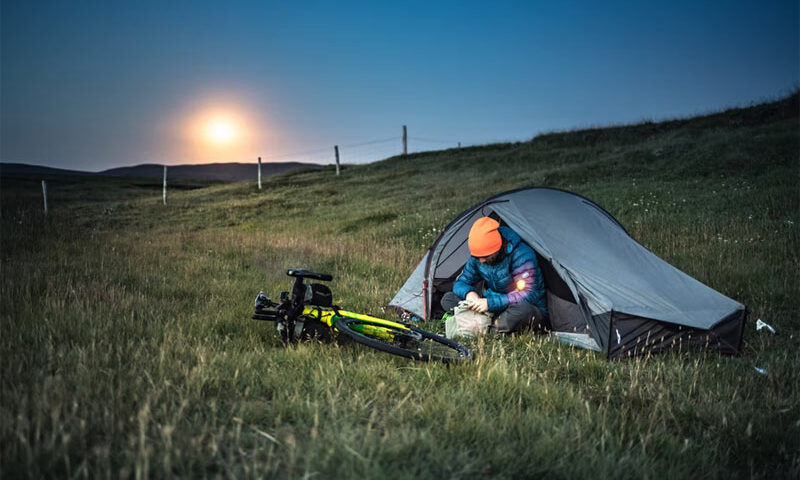The Definitive Guide for Winter Tents for Camping

So, you’re planning a winter camping trip? If you’re traveling to an area where it’s really cold, it may not be the most inviting option. When it comes to a chilly winter camping trip, some people embrace the challenge, while others find it easier if they have a good tent for camping.
In order to be ready for winter camping, you must first get a proper camping tent.
Moreover, no matter what kind of gear you choose, it’s essential to be ready for a winter camping trip since staying in the cold may be quite difficult without proper supplies.
Cold-Weather Tents
A 4 – 4 person tent is an excellent alternative for affordable camping tents for winters. The 4-season is marketed as one of the best camping tents on the market.
These tents are ideal for use in heavy snow, snowstorms, especially at high elevations. A four-season tent is made to withstand all four seasons of inclement weather. They are made of aluminum poles, robust stakes, and points that are built to last. In order to avoid rain and snow from collecting within the tent because of condensation, most tents incorporate high-low adjustable ventilation systems.
It is common for good 4-season tents to have bathtub flooring with seams glued, much like any other well-designed tent. Vestibules for keeping wet and freezing items are included in the completely sealed full-coverage flies.
Car Tents
If you have a vehicle that can accommodate a tent connected to it, a car tent is another alternative for winter camping. Vehicle tents are the best camping shelter alternative to a regular tent since it is very simple to assemble. Remember that cold air beneath metal causes frigid flooring while winter camping in a vehicle or SUV.
A high-quality mattress pad is essential. With a vehicle tent, you can enjoy the comforts of a tent while still maintaining the protection from the weather of your vehicle. If you don’t need a lot of storage space, this is an excellent option since it weighs just five pounds when packed and isn’t very big when unpacked.
For remote camping, a self-contained 4-season tent would be ideal, but if you want to keep toasty in the back of your van, this choice is a more cost-effective alternative.
What if You are Camping in the Mountains?
Climbing to the summit, where the ground meets the sky, requires not just physical stamina but also knowledge and understanding from previous climbs and camping trips. A successful ascent requires a thorough knowledge of gear, camping techniques, and a plan for staying healthy while climbing.
You will need a completely different style of camping shelter for high-altitude camping than the one many people keep in the basement and only use on rare summer outings. In order to survive wind gusts and snowdrifts, high-altitude tents should include a full-coverage cover and aluminum poles. In order to keep the fly and tent fabric out of the wind, a nice high-altitude tent should have a sturdy frame. Use only aluminum pole frames, which are more resistant to breaking at low temperatures.
Apart from camping shelters or camping tents, here are some things you need to keep if you are going mountain camping:
Sleeping Bags
The lower the temperature rating of your sleeping bag, the better. Being warm is of utmost importance. If you start to feel too hot, you may simply open your bag a bit or remove some of your clothing.
Camping Stoves
It’s common for first-time campers to have unpleasant shocks due to the fluctuating air pressure that happens at higher elevations. The degree to which water boils decreases as you go in height. Your stove’s fuel source may also be impacted by the weather. If you’re using a stove outside of the spectrum of the pressure requirements of the fuel, you may have to use multi-fuel burners that can be pressured with liquid fuel.
Disposal Bags
If you don’t have access to such a facility, it might be difficult to freshen up at a high altitude. For the sake of the environment, pack some disposable, odor-neutralizing trash bags.
Other Tips to Keep in Mind:
- It’s a good idea to make use of the surrounding environment while setting up camp at a high elevation. Keep your campsite away from windy areas and make use of natural elements for shelter whenever possible.
- People react to AMS (Acute Mountain Sickness) in various ways and to varying degrees. Remember to bring your medication if you have experienced altitude sickness before.
- Drink more water and stay hydrated throughout your trip. Air in the higher altitudes becomes drier, and the perspiration also increases, making you dehydrated. So it is important to take care of yourself and keep yourself hydrated.
A tent is just as important for winter adventures as fleece and thermal apparel or insulated boots. Prior to making any kind of choice, be sure you’ve done your thorough research and analysis. When in doubt, don’t be afraid to ask the professionals for clarification or assistance.



